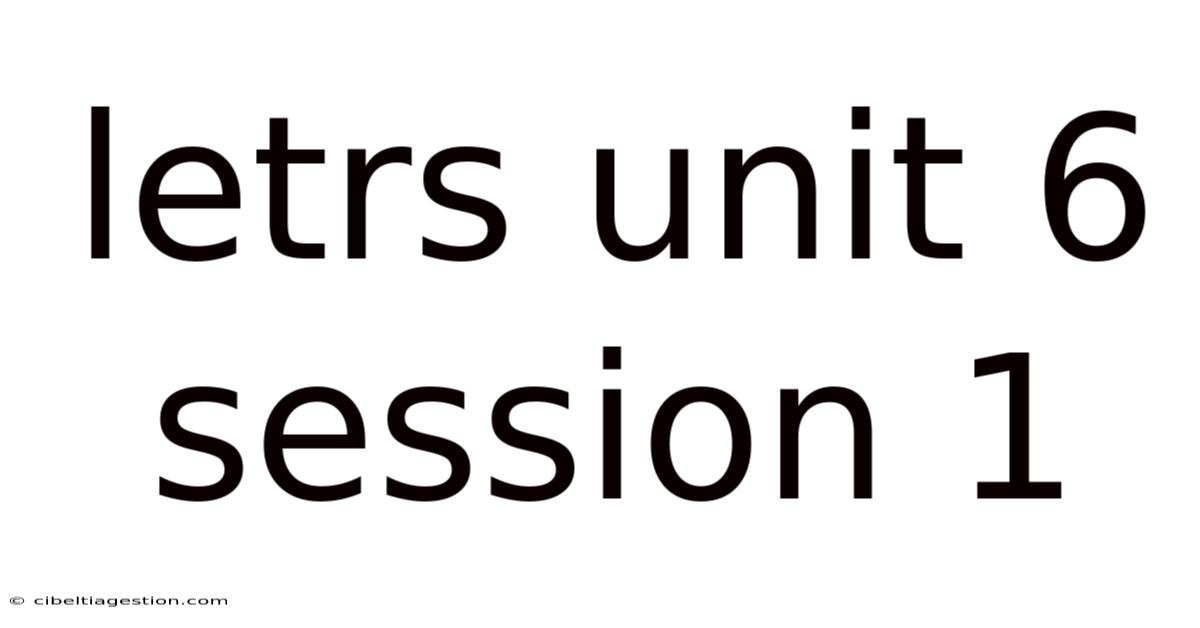Letrs Unit 6 Session 1
cibeltiagestion
Sep 15, 2025 · 4 min read

Table of Contents
I cannot find any publicly available information about a specific educational curriculum or program called "LETRS Unit 6 Session 1." LETRS (Language Essentials for Teachers of Reading and Spelling) is a widely used professional development program for educators, focusing on scientifically based reading instruction. However, the specific content of Unit 6, Session 1, is likely proprietary and not accessible without access to the LETRS program materials themselves.
To write a comprehensive article about this topic, I would need access to the official LETRS curriculum. Without that access, any information I provide would be speculative and potentially inaccurate.
However, I can offer a general overview of common topics covered in professional development programs like LETRS, which might overlap with the likely content of a session such as "LETRS Unit 6 Session 1." Keep in mind that this is a general overview and might not perfectly reflect the specific content of the session.
Understanding the Likely Focus of LETRS Unit 6 Session 1 (Speculative Overview)
Given the general structure and progression of reading instruction programs like LETRS, Unit 6 would likely focus on more advanced aspects of reading instruction. Earlier units typically cover foundational skills like phonemic awareness, phonics, fluency, vocabulary, and comprehension. Therefore, Unit 6 might delve into:
Possible Topics Covered:
-
Advanced Phonics and Morphology: This could include instruction on less common vowel patterns, multisyllabic word decoding, understanding morphemes (meaning units) and their impact on word meaning, and the relationship between spelling and pronunciation.
-
Reading Fluency and Prosody: This might involve strategies for improving reading speed, accuracy, and expression. The focus could be on developing prosodic features (e.g., intonation, stress, pausing) to enhance comprehension and engagement.
-
Vocabulary Development and Academic Language: This section could focus on teaching strategies for acquiring advanced vocabulary, understanding complex sentence structures, and interpreting figurative language. It might also address the specific vocabulary needs of different content areas (e.g., science, social studies).
-
Comprehension Strategies for Complex Texts: This could cover advanced comprehension strategies like making inferences, analyzing author's purpose, identifying different text structures, and summarizing complex information. The session might focus on applying these strategies to various genres of texts.
-
Assessment and Differentiation: LETRS units often incorporate discussions about ongoing assessment to monitor student progress and adapt instruction based on individual needs. This session could focus on identifying students who require specialized support and implementing effective differentiated instruction techniques.
-
Literacy Interventions: This might cover specific interventions for students struggling in particular areas of reading, such as decoding, fluency, or comprehension. The session might discuss evidence-based interventions and how to implement them effectively.
-
Writing Instruction: LETRS often connects reading and writing instruction, as they are deeply intertwined. This session might delve into specific aspects of writing, such as grammar, mechanics, essay writing, or creative writing, and how to support students' writing development.
General Principles Likely Emphasized in LETRS (Applicable to Unit 6)
Regardless of the specific content of Unit 6, Session 1, the following principles are likely emphasized throughout the LETRS program:
-
Scientifically-Based Reading Research: LETRS emphasizes instructional practices supported by robust research on how children learn to read. The program provides educators with a deep understanding of the science of reading.
-
Explicit and Systematic Instruction: LETRS promotes explicit and systematic instruction in phonics, vocabulary, and other essential reading skills. This approach ensures that students receive direct instruction in the skills they need to become proficient readers.
-
Differentiated Instruction: The program emphasizes the importance of differentiating instruction to meet the diverse needs of all learners. This involves providing targeted support to students who are struggling and challenging students who are ready for more advanced work.
-
Data-Driven Instruction: LETRS promotes the use of formative and summative assessment data to monitor student progress and adjust instruction accordingly. This ensures that instruction is aligned with student needs and is effective in promoting reading achievement.
-
Collaboration and Professional Learning: The LETRS program encourages collaboration among educators and provides opportunities for ongoing professional learning. This helps educators to stay current on best practices in reading instruction.
To get the precise details of "LETRS Unit 6 Session 1," you would need to access the official LETRS materials. This overview provides a general context based on the principles and typical content of such a professional development program. Consider contacting the LETRS organization or your local education agency for access to the specific curriculum materials.
Latest Posts
Latest Posts
-
210 Degrees Celsius To Fahrenheit
Sep 15, 2025
-
Greg Tossed A Number Cube
Sep 15, 2025
-
How To Find Frequency Stats
Sep 15, 2025
-
Ounces In 750 Ml Bottle
Sep 15, 2025
-
10 000 Pounds To Tons
Sep 15, 2025
Related Post
Thank you for visiting our website which covers about Letrs Unit 6 Session 1 . We hope the information provided has been useful to you. Feel free to contact us if you have any questions or need further assistance. See you next time and don't miss to bookmark.